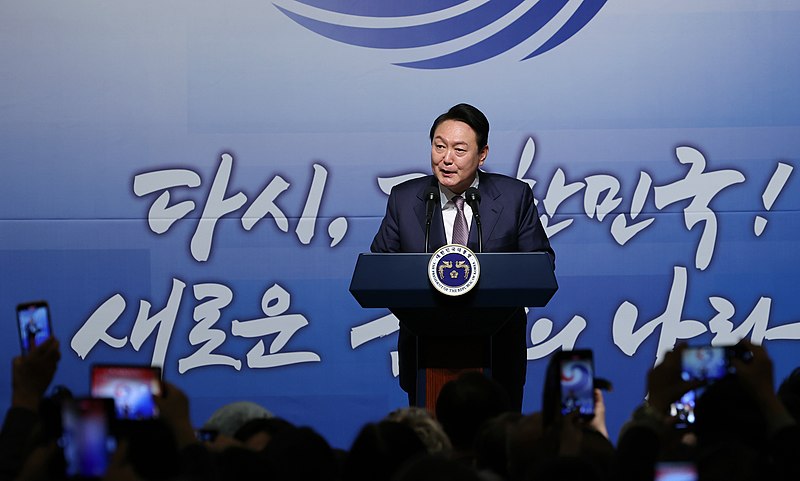The South Korean government has proposed an annual spending cut in an effort to scale back the pandemic stimulus. The annual government spending by the South Korean government would be cut down by six percent.
The South Korean finance ministry unveiled the first budget proposal under Conservative President Yoon Suk-yeol’s administration Tuesday. The government expenditure was unveiled at ₩639 trillion or $473 billion for 2023, six percent smaller than the budget for this year after two supplementary budgets.
This also marks the first government spending cut South Korea has done in 13 years.
“The government is shifting its fiscal policy stance completely to ‘sound financing’ to secure fiscal sustainability, improve external credit standing, and spend responsibly for future generations,” the finance ministry said in a statement.
In order to reach the spending cut, the government plans to “transfer some public projects to the private sector” and cut down the wages of senior officials at the highest levels of the government.
Government spending on infrastructure would also be cut down by 10.2 percent and subsidies and spending for small to medium businesses would go down by 18 percent in 2023.
Not including the extra budget, this means South Korea’s government spending for 2023 would grow by 5.2 percent, which is the slowest since 2017.
The move to lower spending shifts away from the aggressive fiscal spending under Yoon’s liberal predecessor Moon Jae-in and from the major stimulus measures that were taken during the pandemic to help the economy.
The Bank of Korea has also raised interest rates by two percentage points since August last year.
Despite the cuts, the budget also anticipates an increase in social welfare expenses for low-income earners and the vulnerable, as demand for welfare will only likely grow in an ageing economy. Last year, South Korea’s birth rate dropped to a new low of 0.81 children per woman.
South Korea’s deputy trade minister Ahn Sung-il Tuesday raised concerns with the United States over the $7,500 electric vehicle tax credit that would make vehicles assembled outside North America ineligible.
The USTR said Ahn met with deputy US trade representative Sarah Bianchi, and both officials agreed to keep in touch over the issue in the coming weeks.



 U.S. Senate Rejects War Powers Resolution Aimed at Halting Trump’s Military Campaign Against Iran
U.S. Senate Rejects War Powers Resolution Aimed at Halting Trump’s Military Campaign Against Iran  U.S. Officials Review Tencent’s Stakes in Epic Games, Riot Games Over Security Concerns
U.S. Officials Review Tencent’s Stakes in Epic Games, Riot Games Over Security Concerns  Middle East Air War Triggers Massive Flight Cancellations and Global Airline Disruptions
Middle East Air War Triggers Massive Flight Cancellations and Global Airline Disruptions  Australia and Canada Strengthen Critical Minerals Partnership Through New G7 Alliance Agreements
Australia and Canada Strengthen Critical Minerals Partnership Through New G7 Alliance Agreements  Young Trump Voters Divided After U.S. Strike on Iran and Death of Ayatollah Khamenei
Young Trump Voters Divided After U.S. Strike on Iran and Death of Ayatollah Khamenei  Suspected Iranian Drone Hits CIA Station at U.S. Embassy in Riyadh Amid Rising Middle East Tensions
Suspected Iranian Drone Hits CIA Station at U.S. Embassy in Riyadh Amid Rising Middle East Tensions  Trump and Merz Meet at White House Amid Iran Strikes and Trade Tensions
Trump and Merz Meet at White House Amid Iran Strikes and Trade Tensions  European Allies Deploy Air Defenses to Cyprus After Drone Attack on RAF Akrotiri Base
European Allies Deploy Air Defenses to Cyprus After Drone Attack on RAF Akrotiri Base  Defense Contractors Move to Drop Anthropic AI After Trump Administration Ban
Defense Contractors Move to Drop Anthropic AI After Trump Administration Ban  Senators Urge Better Coordination After Texas Counter-Drone Incidents Disrupt Airspace
Senators Urge Better Coordination After Texas Counter-Drone Incidents Disrupt Airspace  Spain Denies Deal With U.S. Military After Trump Threatens Trade Cutoff
Spain Denies Deal With U.S. Military After Trump Threatens Trade Cutoff  Israel-Hezbollah Escalation Deepens Lebanon’s Role in Middle East Conflict
Israel-Hezbollah Escalation Deepens Lebanon’s Role in Middle East Conflict  U.S. Begins Charter Evacuations as Iran Conflict Disrupts Middle East Air Travel
U.S. Begins Charter Evacuations as Iran Conflict Disrupts Middle East Air Travel  Rubio, Saudi Foreign Minister Discuss Iran Threats and U.S. Embassy Riyadh Attack
Rubio, Saudi Foreign Minister Discuss Iran Threats and U.S. Embassy Riyadh Attack  U.S. Pledges Support to Turkey After Iranian Missile Threat
U.S. Pledges Support to Turkey After Iranian Missile Threat  Trump Defends Extended U.S.-Israel Military Campaign Against Iran
Trump Defends Extended U.S.-Israel Military Campaign Against Iran  U.S. Middle East Strikes Raise Indo-Pacific Security Concerns for Japan, South Korea, and Taiwan
U.S. Middle East Strikes Raise Indo-Pacific Security Concerns for Japan, South Korea, and Taiwan 




























